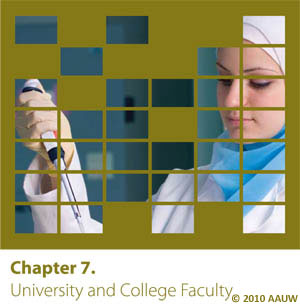


Unpacking a Sense of Fit
 The results of the Collaborative on Academic Careers in Higher Education (COACHE) survey of science, technology, engineering, and mathematics (STEM) faculty show "sense of fit" to be the single most important climate factor predicting job satisfaction. COACHE research director Cathy Trower defines sense of fit as one's sense of belonging in her or his department.
The results of the Collaborative on Academic Careers in Higher Education (COACHE) survey of science, technology, engineering, and mathematics (STEM) faculty show "sense of fit" to be the single most important climate factor predicting job satisfaction. COACHE research director Cathy Trower defines sense of fit as one's sense of belonging in her or his department.
In an interview with AAUW, Trower explained, "If you feel like you don't fit or belong - for whatever reasons - your satisfaction is bound to be lower, because not only is it human nature to want to belong ... it is crucial for getting tenure." She found that the sense of fit was enhanced for both women and men when they felt that they had good professional and personal interactions with colleagues, when senior faculty had an interest in their professional development, and when junior faculty were treated fairly.
Although good professional and personal interactions with colleagues are important for female and male STEM faculty, such interactions may be especially important for women. Many STEM female faculty may be the only women in their departments, and isolation can be a major source of dissatisfaction among female faculty. In Trower's survey, women reported being excluded from informal social gatherings and more formal events as well as from collaborating on research or teaching. Women are also less likely than their male colleagues to say they have role models or mentors and therefore are less likely to get advice on navigating the workplace and advancing in their careers.
A recent study by the National Academy of Sciences found that male faculty were significantly more likely than female faculty to report having discussions with colleagues about research, salary, and benefits. The study results also emphasized the importance of the sense of fit, highlighting that "the most problematic kind of attrition involves faculty who leave because they feel unwelcome. These faculty members have not failed, but they also have not fit in, and the departments they leave have invested time, money, and other resources that can be lost" (Gender differences at critical transitions in the careers of science, engineering, and mathematics faculty. 2009. Washington, DC: National Academies Press. P.98)
If you're a STEM professor, do you feel like you fit in your department? What about other female STEM faculty you know?

Hi Laura,
It's interesting to hear about your personal experience with social interaction as a STEM faculty member. I don't remember many lunch invitations from my male colleagues for the 8 years I worked as an engineer either. I think it contributes to the lower levels of satisfaction women in these professions report.
Thanks for commenting -
Christi
Hi Christi,
Great topic! I know that the COACHE survey has really made my college think about why different groups, including women, feel like fifth wheels. Here's a one-of statistic from my last five years as a biology faculty member: number of times a male colleague in my dept invited me to lunch:0. Number of times a female colleague in my department invited me to lunch: 5 (about once a year). Number of times a female colleague in another dept invited me to lunch: 20 or so. I think, going on a sample of one, maybe the disconnect is especially hard on women in science, leaving us quite isolated if we don't reach out ourselves to make connections. And many don't feel comfortable doing that or don't have time (due to housework and family obligations) or both. Cheers,
Laura















